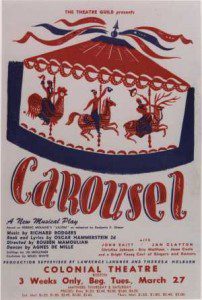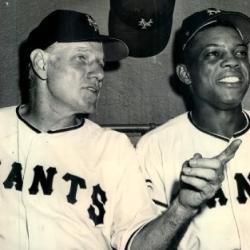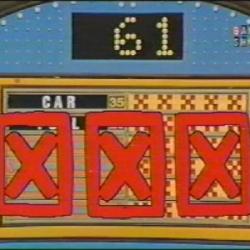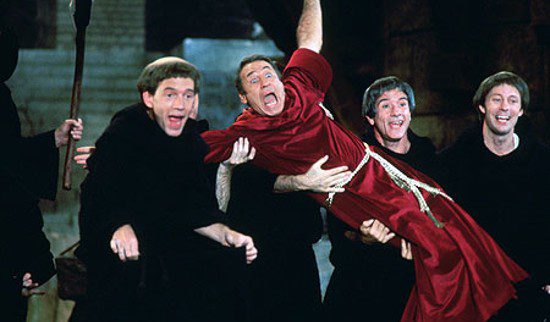John Fea shares some highlights from a Barna Group survey on the reading habits of pastors.
Here’s the finding that struck me as most distressing: “One-third of pastors are reading business books.”
Ugh.
I appreciate that the job of a local church pastor is in some ways analogous to that of an executive, but that doesn’t mean that a local church is in any way analogous to a “business.” If all those pastors reading “business books” — a depressingly vapid genre for which Sturgeon’s Law understates the ratio — are getting the idea that their churches should be more “business-like,” then I fear for their congregations, their ministries, their parishes.*
One way of describing the difference between a local church and a business is by looking at the difference between a Broadway production and community theater.
 Consider a Broadway production reviving an old classic like Carousel. At the very same time, far enough away that the rights are still available, a small community theater prepares its production of the very same play. Both productions share some of the same goals. They both want to tell this story as best they can within the constraints of their respective budgets and talent pools (both of which are far more constraining for the community theater). They both want to make their audiences laugh, cry, yearn and ache. They both want to sell tickets.
Consider a Broadway production reviving an old classic like Carousel. At the very same time, far enough away that the rights are still available, a small community theater prepares its production of the very same play. Both productions share some of the same goals. They both want to tell this story as best they can within the constraints of their respective budgets and talent pools (both of which are far more constraining for the community theater). They both want to make their audiences laugh, cry, yearn and ache. They both want to sell tickets.
But Broadway is a business. Like any business, it wants to hire the best possible people for every role. So the Broadway production holds auditions in which some of the world’s best actors, singers and dancers compete to land a part in the show.
Casting doesn’t work like that at the community theater. Broadway starts with a list of roles to be filled, then selects only the very best people it can find to fill them. Community theater starts with the community — with everybody — and then tries to figure out how best to employ them, how best to manage the assembled ensemble so that everyone is able to participate and to contribute to the common goal.
Think of Mr. Fish in John Irving’s A Prayer for Owen Meany. Mr. Fish isn’t a great actor, but he’s a faithful member of the Gravesend Players and every year Dan Needham, the patient director of the local community theater, finds a role that he hopes will make the best use of Mr. Fish and his talents.
That’s the real magic of community theater. Sure, I can laugh along with Shakespeare at the amateur follies of Nick Bottom, Peter Quince, Francis Flute and Starveling, Snout and Snug in their deliriously awful “craftsmen’s play” in A Midsummer Night’s Dream. But let’s not sneer at them. Here you have a weaver, a carpenter, a bellows-mender, tailor, tinker and joiner working without pay. Why? Because this is something we humans do — we tell stories, we act them out. We’ve done this for as long as humans can remember anything humans have done. And if I were running a community theater, I’d be happy to have them — Quince and Starveling especially, because every theater needs a good tailor and a good carpenter. (I do wonder if Shakespeare ran into any trouble with his set-builders and costumers after they absorbed his mockery of the “craftsmen” in Dream.)
The challenge, and the beauty, of community theater is figuring out how to allow and enable all of these folks to make their best contribution to the production at hand. Mr. Fish might surprise us all and be better than expected if we cast him as “Mr. Snow” in Carousel. Starveling, Snout and Snug might fit in best as townspeople in the big “Clambake” scene.
The point is that the task for a community theater is the opposite of the task for Broadway. Broadway wants to find and to hire only the very best possible people for every role. Community theater wants to get the best possible contribution from every person in the community.
A local church should be more like community theater than like Broadway.
And so should the entire country. This is why I cringe whenever I hear someone suggest that we need a “CEO president.”
No. No we do not. A CEO is completely unqualified to be president. A CEO is someone who has spent years preparing for how not to be president.
Think of the matter of full employment. Full employment for a CEO means finding and hiring only the very best people for every position in your company. That’s easy. That’s like trying to find good dancers on Broadway.
But what about all those people who are not “the very best”? The CEO doesn’t care. The CEO doesn’t have to care.
A president does. For a president, “full employment” means that everyone who is capable of working is able to find work. That doesn’t just mean the most talented, best-educated, most capable people, but everyone — the incompetent, the perpetually confused, the easily distracted, the socially maladept, the clumsy, the dim, the schlemiels and schlimazels and every other variety of bungler and screw-up. They need work too. They need to be allowed and enabled to participate and to contribute. And just like in community theater, the challenge is to help them find the right role that will make the best of whatever abilities they have.
If you’re in charge of a business, then you simply fire the bunglers and the screw-ups, the Snouts and the Starvelings. Or you never hire them in the first place. What becomes of them after they’re fired, or if no one ever hires them? Not your problem. Not your concern.
But if you’re in charge of a country, or if you’re in charge of a local church, then it is your concern. You can’t just restrict yourself to the winners of the audition, to “the best and the brightest.” Your job is to make sure that everyone is allowed, encouraged, enabled and empowered to contribute to the best of their ability — whatever their ability may be. Everyone is your concern. Everyone is your problem.
No, wait, not your “problem.” That’s the wrong word. That’s CEO-speak. People are not problems — that’s a lie told by “business books.” Everyone is your community. Everyone is your neighbor.
http://www.youtube.com/watch?v=pfwc-_92zOc– – – – – – – – – – – –
* “Parish” is an archaic term referring to the long defunct notion that a local church carried certain obligations based on its geography and not on brand-affinity, ethnic and economic demographics, and partisan political identity. The automobile abolished the parish more than a generation ago. Any church with a parking lot does not have a parish.












